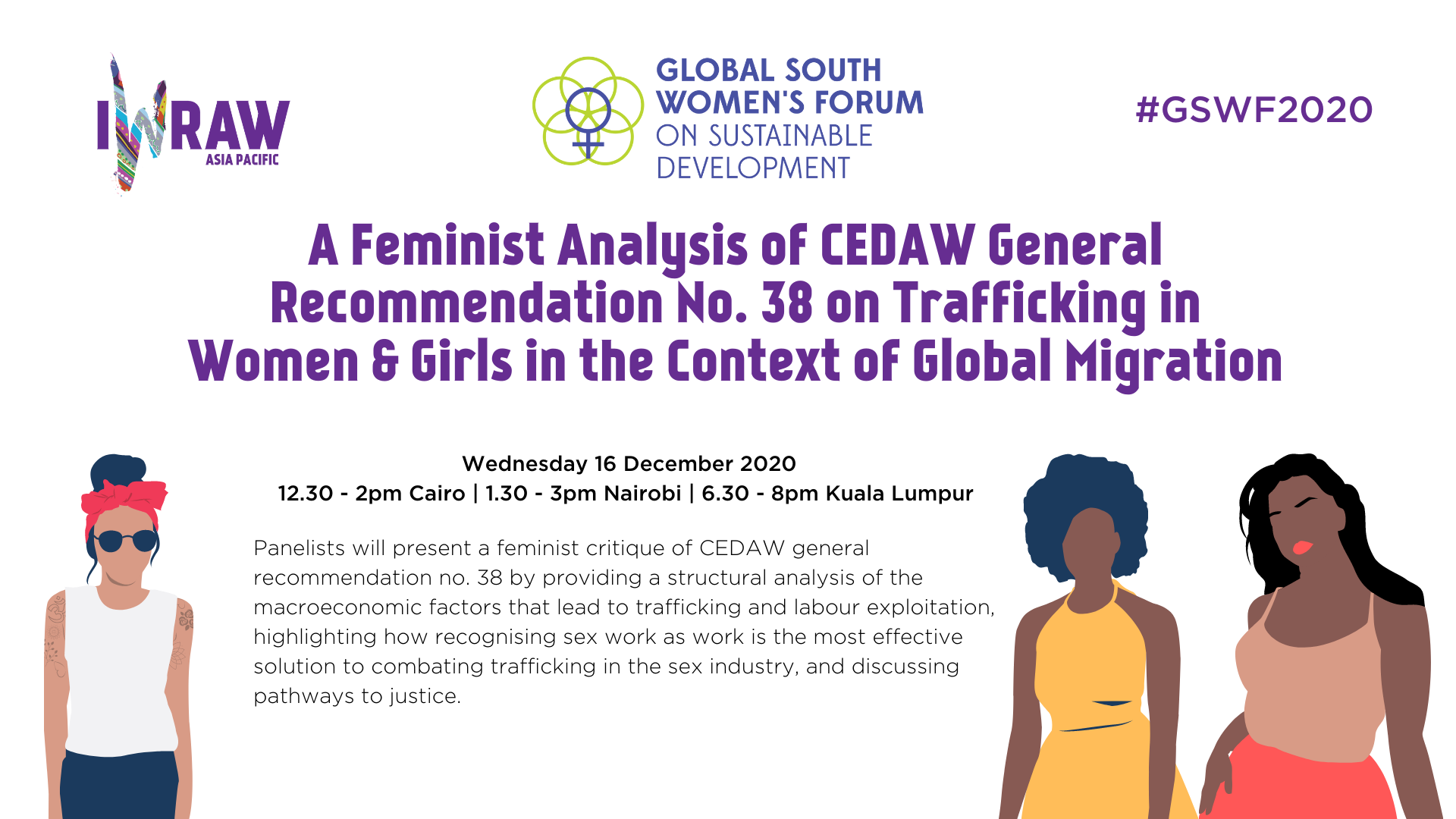
CEDAW General Recommendation 38 on trafficking in women and girls in the context of global migration was adopted in November 2020. It recognises that ‘globally dominant economic policies are the cause behind large-scale economic inequality between States and individuals that manifests as labour exploitation’. It also highlights that macroeconomic factors produce the conditions of economic injustice that disproportionately impact women. But despite the initial promise of this structural analysis, subsequent sections deviate to the familiar and dangerous tropes of the anti-trafficking world: discourage demand, prosecute those on the demand side, and link trafficking to ‘sexual exploitation’.
On 16 December 2020 at the Global South Women’s Forum, IWRAW Asia Pacific held a panel to present a feminist analysis of GR 38 with the aim of providing a structural analysis of the globally dominant neoliberal economic model that leads to trafficking and labour exploitation, highlighting that recognising sex work as work is the most effective solution to combating trafficking in the sex industry, and presenting innovative examples of opening pathways to justice for persons affected by trafficking and labour exploitation. Among the panelists were Phelister Abdalla of Kenya Sex Workers Alliance, and Radhika Coomaraswamy, former UN Special Rapporteur on violence against women, its causes and consequences. Below, we share some of their insights during the conversation, edited for clarity and concision. Read part one here.
Feminist analysis is as concerned about the process as the substance (if not more). Having been involved in conducting advocacy to inform the development of this GR, what are your key reflections, particularly on the processes for international human rights standard setting? Please also reflect on the ways in which we can make processes and mechanisms accountable to the people and movements who are most affected, including on implementation at the national level.
Radhika Coomaraswamy: Whatever happens, one has to continue to engage with CEDAW and maybe try and move it constantly. At no point should there be a lack of engagement, especially by all of you who are so active in the movement.
I was recently reading Annie Isabel’s Fukushima’s book Migrant Crossings: Witnessing Human Trafficking in the US. She talks about the concept of witnessing, and what she says is [that] whether we are in the women’s rights world or human rights world, our writings and documents are based on witnessing terrible violations. Bearing witness is partial, subjective, and relevant to a narrative. The point is that there are so many witnesses: the victim/survivor herself who would be a witness, local and national intermediaries are witnesses, the communities in which cis and trans women live are witnesses, and of course there are the State actors. An inclusive process means that all these voices have to be heard and the priority given to the victim/survivor. It is very important to understand and represent the diversity of the victim/survivor. Any legislative process, especially a human rights one at the international level, should represent diversity of perspectives. One is not happy with GR 38 because it doesn’t attempt to make sure that all those voices are heard and be inclusive of them.
On the question of intermediaries, Professor David Kennedy has done a major critique of human rights and women’s rights movements, saying that they are influential and that more and more depend on whose voices are heard at the international level. We are in the women’s rights movement, but to a certain extent, the movement has been hijacked in a sense by those interested in crime and punishment rather than human rights. I was the first Special Rapporteur on violence against women, when we first presented the issue before the Human Rights Council as a human rights issue. All the major human rights activists, represented by men of course, did not want this to be a human rights issue. Their argument was that we were going to go into partnership with the State to try and implement anti-violence policies to fight this impunity and that partnership with the State was a dangerous zone.
Impunity is a human rights issue. There is something to what they say, because now we have people who are not human-rights-oriented but who are very much crime- and punishment-oriented who are pushing this agenda. They are the voices that are being heard internationally. They have major States and groups of States supporting them. They have managed to silence other voices. We have to ensure that in the women’s movement, we regain the culture of democracy and of everybody’s voice being heard and find formulas that allow all voices to be represented. It was only in the last century that people thought of majority rule, where whoever has the majority should win. Now we’re really working towards inclusivity and compromise and consensus, which has come out of the multilateral processes themselves, and where solidarity is key. There is a way to work towards a women’s movement that is more democratic and inclusive in putting its views forward and lobbying international organisations.
IWRAW Asia Pacific should analyse this process – how did this happen, especially when there were so many vibrant voices of sex workers involved? This could be an interesting case study for the women’s movements generally. As a teacher, as I read more, I find that we are being overtaken by a kind of crime and punishment framework to a lot of issues that initially begin as human rights issues. I think we shouldn’t forget that in this discussion.
Phelister Abdalla: When it comes to accountability, as a sex worker, as a community person, I would really look at at how vibrant the sex workers’ movement has been and how much effort has been put by NSWP, IWRAW Asia Pacific, and others into this process, as well as by sex workers themselves.
As a country, we submitted shadow reports to CEDAW. In Kenya’s CEDAW review process, the challenges faced by migrant sex workers when they work in different countries were shown. Sometimes they get arrested just because of the conflation between sex work and trafficking. Many migrants were being murdered in Kenya simply because they did not have papers. It is difficult to track their families and where they come from. This is an issue and evidence was provided for this. It is a long and expensive process but we are committed as sex workers. But the question is how accountable is the Committee? How committed are they to look at different women’s issues? Because women are coming from different careers. Not all women are lawyers, not all women are doctors, not all women are housewives. Some have made different choices, like sex workers. Is this a platform for all women? Is this a platform where all voices of the women are heard? These are many of the questions that I still have as a community person who has been denied a right, whose voice has been denied to be heard.
This is very complicated, because when I saw the recommendations come out, I was actually very disappointed because personally I was really engaged in the process. And the issues in countries are real. People are facing real issues in their countries. We want decriminalisation because all we want is a safe working environment and for sex work to be work just like any other work. If we have such recommendations coming from a body like CEDAW, are we really looking at sex work being decriminalised at all in our countries? Because the governments can be using them against us. We really need to rethink.
Watch the conversation in full on YouTube. Our thanks to Angie Hunt for transcription.

